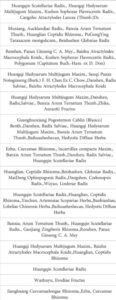Erforschung des Signalwegs und des damit zusammenhängenden Mechanismus der Intervention der traditionellen chinesischen Medizin bei chronischer Gastritis im Rahmen der „Entzündung-Krebs-Transformation“
Abstract
Objective
The aim of this study is to uncover the traditional Chinese medicine (TCM) treatments for chronic gastritis and their potential targets and pathways involved in the “inflammation-cancer” conversion in four stages. These findings can provide further support for future research into TCM and its active components.
Materials and methods
The literature search encompassed PubMed, Web of Science, Google Scholar, CNKI, WanFang, and VIP, employing keywords such as “chronic gastritis”, “gastric cancer”, “traditional Chinese medicine”, “medicinal herb”, “Chinese herb”, and “natural plant”.
Results
Herbal remedies may regulate the signaling pathways linked to the advancement of chronic gastritis. Under the multi-target and multi-pathway independent or combined reaction, the inflammatory microenvironment may be enhanced, leading to repair of damaged gastric mucosal cells, buffering the progress of mucosal atrophic degeneration via the decrease of inflammatory factor expression, inhibition of oxidative stress-induced damage, facilitation of microvascular neovascularization in the gastric mucosa and regulation of the processes of gastric mucosal cell differentiation and proliferation. Simultaneously, the decreased expression of inflammatory factors may impact the expression of associated oncogenes and regulate the malignant proliferation of cells, thereby achieving the treatment and prevention objectives of gastric cancer through the reduction of cell metastasis and apoptosis.
Conclusion
Chinese medicine formulations and individual drugs can be utilised at various stages of the “inflammation-cancer” progression of chronic gastritis to prevent and treat gastric cancer in a multi-level, multi-targeted, and multi-directional fashion. This can provide guidance for the accurate application of medicines during different stages of “inflammation-cancer” transformation. New insights into the mechanism of inflammation-cancer transformation and the development of novel drugs for chronic gastritis can be gained through an extensive investigation of TCM treatment in this condition.
Autoren
Wang Yan-Rui, Yan Xue-Er, Ding Mao-Yu, Lu Ya-Ting, Lu Bo-Heng, Zhai Miao-Jie and Zhu Li
Journal
Frontiers in Pharmacology
Link: https://www.frontiersin.org/journals/pharmacology/articles/10.3389/fphar.2024.1338471/full
DOI: https://doi.org/10.3389/fphar.2024.1338471
Kommentar:
Verwendete Rezepturen/Kräuter:
- Huangqin Scutellariae Radix – Gelbwurz (Scutellaria baicalensis)
- Banxia Arum Ternatum Thunb. – Weißer Aronstab (Pinellia ternata)
- Danshen, Radix Salviae – Chinesische Rotsalbei (Salvia miltiorrhiza)
- Renshen, Panax Ginseng C. A. Mey – Ginseng (Panax ginseng)
- Baizhu Atractylodes Macrocephala Koidz. – Atractylodes (Atractylodes macrocephala)
- Huangqi Hedysarum Multijugum Maxim – Astragalus (Astragalus membranaceus)
- Coptidis Rhizoma – Coptis (Coptis chinensis)
- Curcumae Rhizoma – Kurkuma (Curcuma longa)

